Research and Innovation
On Fertile Ground
2018_%20.png?crc=3873734352)
PDF Version
Past Issues
Vision and Mission
An Extract from
the University’s
Annual Accounts 2018–19
The University Profile
Officers of the University
The Court
Teaching and Learning
Research and Innovation
Knowledge Exchange and
Technology Transfer
Message from the
President and
Vice-Chancellor
E-Book
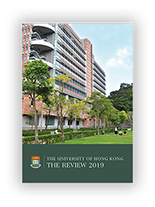
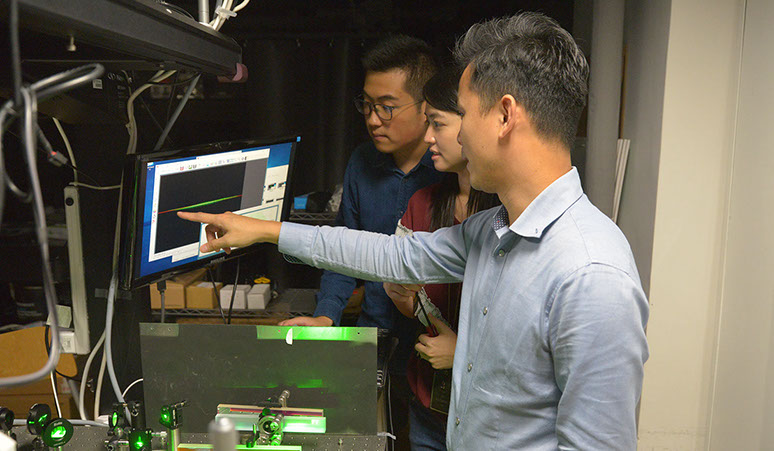
In collaboration with the University of California, Berkeley, Dr Kevin Tsia (far right) from the Department of Electrical and Electronic Engineering was awarded a funding of over US$2 million from the BRAIN Initiative Fund of the US National Institutes of Health for a project to develop a high-speed optical imaging technology for recording fast neural activity throughout the living animal brain.
Opportunity came knocking in 2019 as vast new sources of research funding became available in Hong Kong. HKU scholars quickly seized the day to advance their research. The University also invested in attracting more young stellar talent from around the world to augment our foundations for future growth.
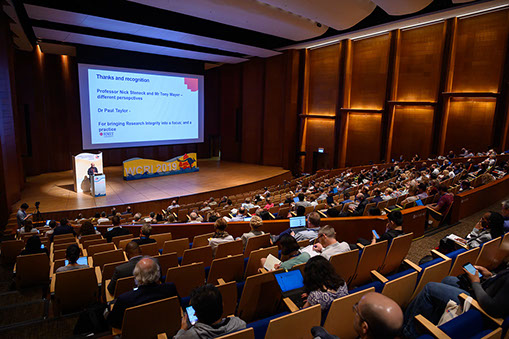
The 6th World Conference on Research Integrity was held at HKU in June 2019 with the participation of 700 delegates from around the world.
The 2018–19 academic year brought remarkably good news for scholars in Hong Kong. The Hong Kong government released a large new reservoir of research funding, while doors opened for Hong Kong scholars to apply for certain competitive research grants from Mainland China. HKU is well poised to take advantage of these opportunities, having applied ourselves rigorously in recent years to recruit stellar academics, encourage and provide opportunities for interdisciplinary research, forge collaborations with top-ranked universities around the world, and invest in upgrading our facilities.
In 2019, legislative approval was given to boost government funding for research to $20 billion. Some of this will be used to launch InnoHK, which provides as much as $500 million each for major cross-disciplinary research programmes. Although the results of InnoHK were not announced in time for The Review’s deadline, HKU submitted strong proposals in health and artificial intelligence and robotics that have great promise of being approved. In addition, the University continued to be very successful in the standard competitive funding programmes of the Research Grants Council (RGC). In 2019 we were the top performer among all Hong Kong institutions in the General Research Fund, receiving $162.521 million for 217 projects. HKU was also a top performer in the Theme-based Research Scheme and the Humanities and Social Sciences Prestigious Fellowship Scheme, among others.
Easier access to research funds from Mainland China was also a highlight of the year. Hong Kong scholars can now apply to certain national funding programmes for research that will be conducted in Hong Kong. The first Hong Kong recipient was Professor William Lu Weijia from the Li Ka Shing Faculty of Medicine who received a RMB27.44 million grant from the National Key R&D Program run by the Ministry of Science and Technology (see Attracting Support). HKU also did well in the prestigious Excellent Young Scientists Fund of the National Natural Science Foundation of China (NSFC), which recognised Hong Kong and Macau scientists for the first time in 2019. Seven HKU scientists were honoured, the most of any local institution. HKU scholars also succeeded in securing funding for 21 projects under the NSFC.
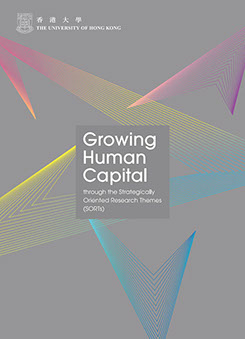
Growing Human Capital through the Strategically Oriented Research Themes (SORTs) focuses on our new generation of academics whose works are inspirational and promising, providing indicative highlights of our emerging talents and illustrating the rich dimensions of the SORTs. The brochure can be viewed at www.rss.hku.hk/sort/sort-2019/.
Access to research funding on the Mainland is not confined to the national level. Guangdong and Shenzhen both signalled that Hong Kong scholars could apply to their funding programmes, too, and five HKU projects received grants under the Shenzhen Science, Technology and Innovation Commission. HKU is also playing an active role in the new Guangdong-Hong Kong-Macao Centre for Interdisciplinary Sciences, which will be a powerful science and technology hub in southern China.
The foundation of our success in these endeavours is our strong talent pool. The University has been strategically recruiting promising and outstanding scholars, including those with an interdisciplinary focus. (Interdisciplinarity is also encouraged through our Strategically Oriented Research Themes [SORTs], which were launched in 2017–18 to provide seed funding for developing projects.) We made a major commitment in 2019 to invest in young talent with the launch of our Presidential PhD Scholarships and Post-doctoral Fellowships. Our aim is to attract the best young scholars in the world and provide them with funds to support their research at HKU, in addition to funds provided by the Hong Kong government. About 100 scholars will be recruited in each category over three years. To further sharpen our focus on grooming young talent, the deanship of the Graduate School has been turned into a full-time position and an associate dean has been charged with the portfolio of promoting innovation and internship and providing graduate students with alternative career development paths.
Achieving impact from research is a central aim of our work and of growing significance in academia, reflected in the RGC’s coming Research Assessment Exercise (RAE). This is the first time the RGC will assess impact and the University has provided extensive support to help scholars prepare, including providing funds for gathering evidence and bringing experts in to give advice and organising a series of impact-related workshops. The RAE results will not be out for at least another year, but the exercise has contributed to the momentum within the University community to deepen our research impact.
Another forward-looking development in 2018–19 was the announcement of the Tech Landmark, which will be built at 2 University Drive on the Main Campus. This will significantly upgrade and expand our facilities for scientific and technological research. The Tech Landmark will have four buildings dedicated to 10 strategic research areas that have a strong interdisciplinary focus. The first institute to be established will be the Institute of the Mind, which received a $150 million donation from Dr Lee Shau-kee.
Underpinning all these activities is our leadership in research integrity. In June 2019, HKU hosted and co-chaired the 6th World Conference on Research Integrity. Some 700 delegates came from around the world to discuss integrity issues related to innovation and commercialisation, and assessment of research. The latter led to the formation of the Hong Kong Principles for Assessing Researchers: Fostering Research Integrity, which is a blueprint for scholars around the world on responsible research conduct. HKU’s excellence, coupled with its commitment to research that is ethical and reproducible, mark us out as a global leader.
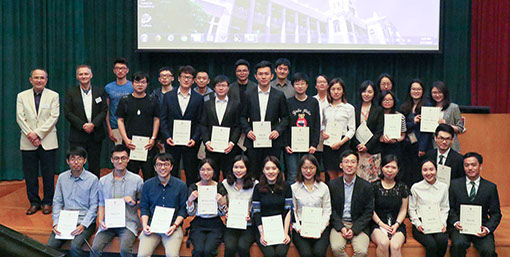
Jointly organised by the Graduate School, Graduate House and Postgraduate Student Association and aiming to promote interdisciplinary research amongst postgraduate students, the Interdisciplinary Research Competition (IRC) was held for the third time in April 2019.
2,670
ongoing research collaborations
in 2018–19 with partners on all five continents.
for new research grant projects.HKU’s cumulative funding from the RGC includes $162.521 million (excluding on-costs) in General Research Fund grants, for which it has been the top recipient in 16 of the last 17 rounds. Two of the five Theme-based Research Scheme projects awarded in 2019 were led by HKU scholars, who were awarded a total of $105.56 million (including on-costs). Other funding sources include the government, industry, non-government organisations and other local and non-local sources. New contract research projects for the government and industry amounted to $146.8 million in 2018–19.
13
Highly Cited Researchers
ranked by Clarivate Analytics in 2019, based on producing multiple highly-cited research papers.
7
Excellent Young Scientists
named by the Mainland government, honouring for the first time the exceptional talent of Hong Kong and Macau scholars. HKU had the largest share (7 out of 25 awarded) in the region.
$373.7M
funding from UGC and RGC
$843.9M
funding from other sources
+